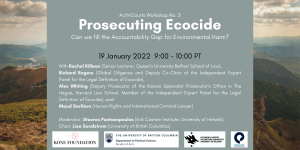
On Wednesday, January 19, Activists in International Courts hosted a virtual panel discussing a recent proposal to add ecocide as the Fifth International Crime.
The panel, chaired by UBC Political Science Professor Lisa Sundstrom, discussed the challenges of defining and prosecuting ecocide, how to fight against impunity of environmental crimes in practice, and the limitations of the proposed definition.
The event was moderated by Dr. Stavros Pantazopoulos, a post-doctoral researcher with the Toxic Crimes Project of the Erik Castrén Institute at the University of Helsinki and a Co-Chair of the Law Interest Group of the Environmental Peacebuilding Association. We spoke to Dr. Pantazopoulos about what the event means for Activists in International Courts.
In June 2021, a new definition was proposed by the Stop Ecocide Foundation that labeled ecocide an international crime. Who has been involved in this proposal and what are the next steps for them?
Taking into account the growing momentum of criminalizing the mass damage and destruction of ecosystems, interested parliamentarians from governing parties in Sweden requested the Stop Ecocide Foundation to propose a legal definition of ‘Ecocide’. Following this request, the Stop Ecocide Foundation convened an Independent Expert Panel in November 2020, which was composed of twelve prominent international lawyers, including two of our panelists. The Panel was assisted by outside experts and a public consultation that brought together hundreds of ideas from legal, economic, political, youth, faith, and indigenous perspectives from around the globe. A consensus on a core text of a definition of ‘ecocide’ as an international crime was reached in June 2021.
The objective for the proposed definition is to serve as the basis for amending the Statute of the International Criminal Court (ICC), so that the crime of ecocide becomes the fifth international crime of the ICC Statute, sitting along the other four international crimes proscribed in it, namely genocide, crimes against humanity, war crimes, and aggression.
What are some of the benefits and challenges to creating a definition of Ecocide as the Fifth International Crime? What insights do your panelists bring to this discussion?
On a symbolic level, defining and criminalizing ‘Ecocide’ could send shockwaves through the international community. This is a strong message that the causation of massive environmental harm will not go unpunished. Moreover, the inclusion of ‘ecocide’ in the ICC Statute may serve as an effective deterrent and further ensure that appropriate reparations for environmental harms are granted. But this is only one side of the story.
To name a few challenges, as our panelists have already argued, a proposal to amend the ICC Statute to incorporate the international crime of ‘Ecocide’ may face procedural hurdles, such as the failure to gain the required majorities of State Parties for inclusion or temporal jurisdiction limitations (principle of non-retroactivity) if ecocide eventually becomes the fifth international crime of the ICC Statute.
What are you looking forward to from the discussion at ActInCourts upcoming workshop?
Given the diverse background of our speakers, we are confident that the ensuing discussion will highlight the untapped potential of combining theoretical with practical insights. Our discussion will showcase the advantages and the attendant risks of defining and criminalizing ‘ecocide’. In addition, our Roundtable will help us identify not only the entry points in the international legal and judicial architecture, so as to pursue claims of mass environmental destruction, but also the blind spots of such a definition.
How would this new definition impact the work of Activists in International Courts?
We truly hope that the newly proposed definition of ‘ecocide’ will open up novel opportunities to rights advocates for prosecuting the commission of environmental wrongdoing. Our network, Activists in International Courts (ActInCourts), is interested in expanding our understanding of international rights advocacy to new types of rights emerging on the frontiers of international jurisprudence. In fact, such a definition carries the potential to inform the work of ActInCourts and turn into a guide and a source of inspiration for future endeavours. Rights advocates can already use this definition when pursuing environmental claims before international courts and tribunals so that it becomes firmly grounded in existing institutional practices. If this definition is taken up by international judicial bodies, it will be further bolstered and thus serve as the reference point when prosecuting environmental wrongdoing.
